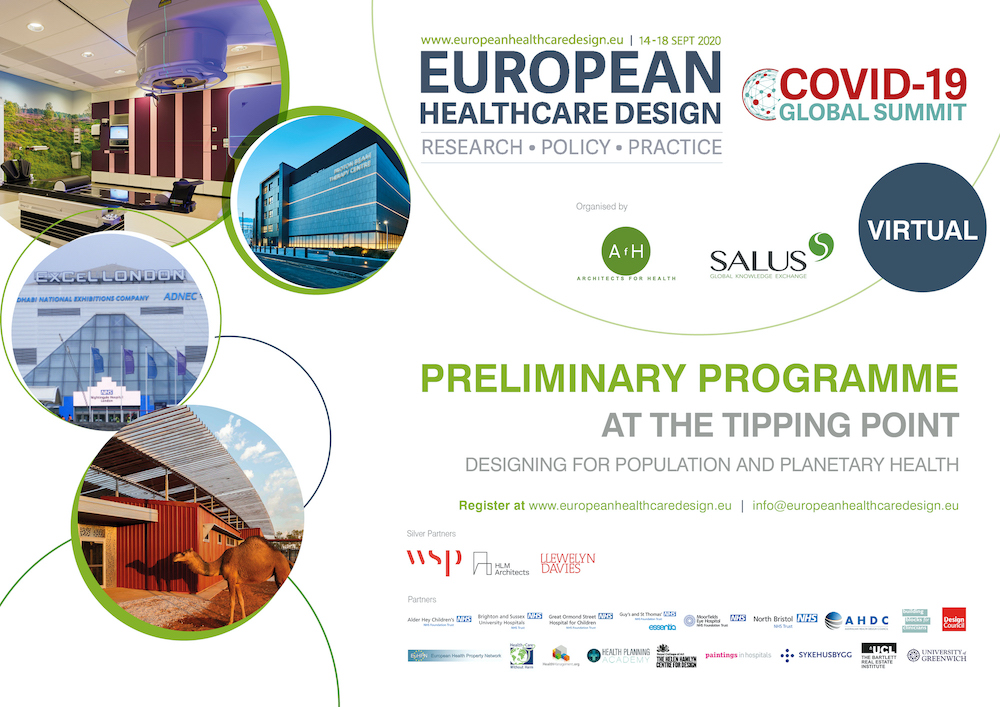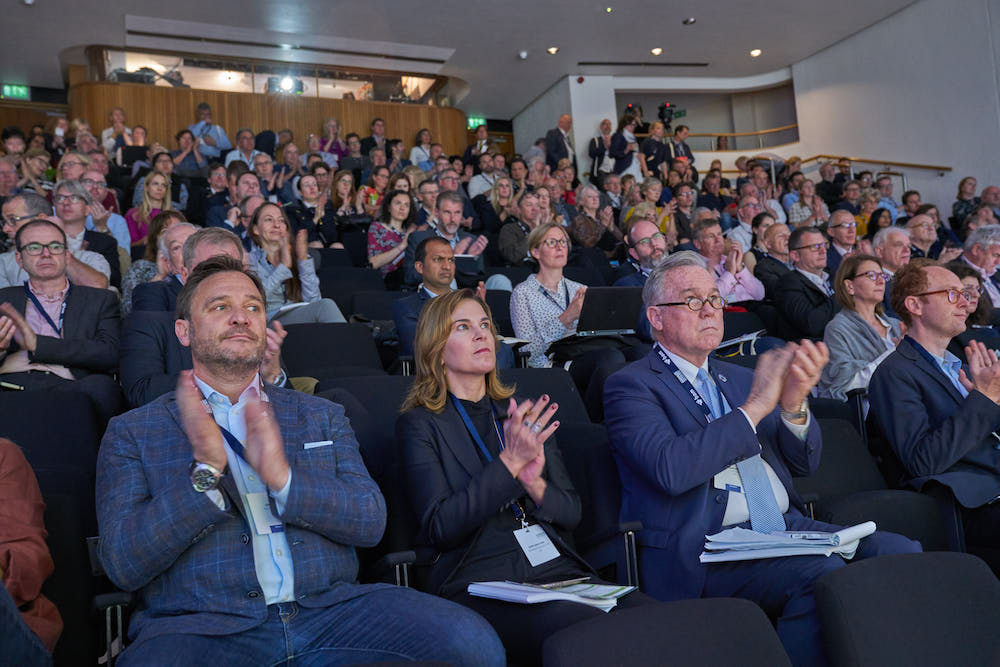We’re delighted to announce the relaunch of the Preliminary Programme for the 6th European Healthcare Design 2020 Congress, rescheduled to 14-18 September 2020 and now taking place entirely in a ‘virtual’ setting. Please access the virtual events site here.
Following a thorough consultation with our event partners and other key stakeholders, the organising committee has taken this difficult decision to protect public safety as the only ethical and responsible response to the continuing spread of COVID-19. Amid great change, however, comes new opportunity, and we are excited by the prospect of extending access to world-leading research, practice and policy thinking in the healthcare design field to a global audience remotely at a time when it is needed more than ever before. You can now download the revised Preliminary Programme via the EHD2020 website.
Online registration is also now open – at very attractive rates for UK residents and delegates from elsewhere in the world.
The programme and registration details can also be viewed at the virtual event site.
Format
The new virtual format for European Healthcare Design 2020 features five days of streams, comprising nearly 60 sessions of talks, panel discussions and workshops. The first three days (14-16 September) will include two streams running alongside each other, as well as a third stream of poster presentations. On days four and five (17-18 September), there will also be three streams: one dedicated to the new COVID-19 Global Summit on Healthcare Design – A New Paradigm; one continuing the presentations from EHD2020; and the third devoted to the European Healthcare Design Awards 2020 shortlisted projects. Every day between 13.00 and 13.30, we will also be hosting an ‘Innovation showcase’ for exhibitors in the virtual ‘Expo area’. And to conclude the congress, day five (18 September) will culminate with a virtual ceremony to present the EHD2020 Awards. Please note that all times in the programme are British Summer Time (BST).
In recognition of the urgent challenges that lay before us, the main plenary theme for European Healthcare Design 2020 will be healthcare ‘At the Tipping Point: Designing for Population and Planetary Health’. Healthcare is an active participant in the climate change and environmental degradation damaging our planet. So, our objective in 2020 is clear: to construct a comprehensive narrative for sustainable design in the widest sense – health system redesign, architecture, landscape, funding models, scientific and digital technologies, products and infrastructure, along with good food, art and access to nature. 
At the tipping point
Healthcare is now the biggest ‘industry’ in the world and the single largest component in the economies of many developed countries. It’s a voracious consumer of goods and services, producer of waste and generator of carbon. But if a physician’s primary obligation is to ‘do no harm’, then we must accept that a population-based health system has environmental responsibilities that extend far beyond its delivery of care.
Governments and systems are addressing these with varying degrees of success but the scale of the environmental challenge suggests that programmes of incremental change are insufficient. A fundamental transformation in service models is required. This, in itself, carries significant risk because we know that prescriptive and top-down driven changes to complex systems have unintentional consequences, which are often more disruptive than the reform’s primary objectives.
Organised by Architects for Health and Salus Global Knowledge Exchange, the European Healthcare Design Congress provides a vibrant forum for addressing these issues, bringing together clinicians, policy advisors, academics, architects, designers and artists. Now in our sixth year, we’ve grown into a worldwide virtual community.
Redesigning healthcare systems
The redesign of networks is the most important factor. Procurement and transport produce more than 75 per cent of the carbon emissions in healthcare systems, yet so much discussion is focused on the built environment, however important this may be.
The changes needed to improve environmental sustainability are much the same as those needed to deliver quality improvements and financial sustainability. Services need to be redesigned to shift care upstream and place greater emphasis on primary care, prevention and self-management.
Where are we making better use of digital technologies, developing more integrated forms of care, removing duplication and redundancy from care pathways, empowering patients, and moving care closer to home?
Where are we mitigating the worldwide shortage of human resources by nurturing settled employment and career advancement in systems, and how can AI and digital technology supplement or replace human resource?
How do we increase the resilience of services to environmental change while reducing the impact of services on the environment?
Digital connectivity is providing us with the structural framework that healthcare networks need to inform and empower staff and patients, and move them efficiently around the system. Alongside this, we need to understand what advances have been made in AI, pharma, robotics and algorithmic diagnosis. Which of these are making a real contribution to sustaining our systems and which are, as yet, illusory? 
Redefining public health
The ability of population-based healthcare systems to achieve sustainability relies on a more dynamic integration of health and social care with housing, planning, transport and social support.
Tensions between personal freedoms and legislative intervention are intensifying in some areas but dissipating in many others, as citizens increasingly understand that they must exercise personal responsibilities within a wider framework of governmental action. Yet there is enormous disaffection with politics and politicians.
Healthcare projects will increasingly be part of wider mixed-use developments, which in turn will require mixed funding. Healthy towns and cities need stronger local government to co-ordinate development and organise more intelligent, transparent ways of using public and private financing.
From disposable to circular
The age of the disposable building has passed. If we adopt a circular economic model then any healthcare building should be capable of alternative future use and fulfil a greater role in the public realm. As high-street shops fall empty, their replacement with innovative social and healthcare centres may help sustain town centres.
More extreme climates encourage innovative architecture, with buildings designed that are climate adaptable, very low- or zero-carbon, and energy efficient. What commercial and technical innovations are developing to reduce costs and improve quality? Active buildings can integrate renewable energy technologies for heat, power and transport as components of an active healthcare network and smart city. Can we combine standards for Passivhaus and lifetime homes with technological advancement to create a truly adaptable home? We’ve separated building and landscape design for too long; the future will see significant investment in greening our cities.
Healthcare design post COVID-19
The impact of COVID-19 on healthcare design will be felt for years. In some cases, the pandemic will accelerate trends already in play prior to the crisis, such as the need for infrastructure to be adaptable to changing needs, closer co-ordination of primary and secondary care, and delivery of health services via digital technology. In other ways, COVID-19 has raised new design issues. For example, designing in surge acute and critical care capacity, supporting the mental health of patients and health workers, the impact of social isolation and health inequalities, and resourcing staff with proper medical equipment and PPE.
Why attend?
Presented in its new virtual format from 14-18 September, the 6th European Healthcare Design 2020 (EHD 2020) Congress and Awards, including the inaugural COVID-19 Global Healthcare Design Summit, is the world’s leading forum for the exchange of knowledge on the relationship between research and health policy and practice within the field of healthcare design.
Congress attendees will develop their knowledge of the political, social, economic and environmental context, emerging practice, skills and core competencies in designing and commissioning health services, technology and infrastructure, project management, and the evidence base for healthcare design, sustainable development and quality improvement.
With access to over 200 talks, workshops, poster and award presentations, and more than 25 virtual exhibitions – as well as the ability to create your own personal profile and network via live chat and messaging, and video meetings – attendees will enjoy a unique professional development and networking experience with colleagues in the healthcare design field from all over the world at accessible prices.
A range of ticket types is available, giving attendees from all over the world great value for money. Members of Architects for Health, the Union of International Architects Public Health Group, the Australian Health Design Council, the New Zealand Health Design Council, and the European Health Property Network are entitled to a 20% discount. Please apply for your discount code at info@europeanhealthcaredesign.eu. Please note that a discount code may only be used once by the same user. Attendee registration is available via www.europeanhealthcaredesign.eu.
We look forward to welcoming you in September to the virtual congress, and your contribution to the critical exchange of knowledge as global health systems navigate a new world.

